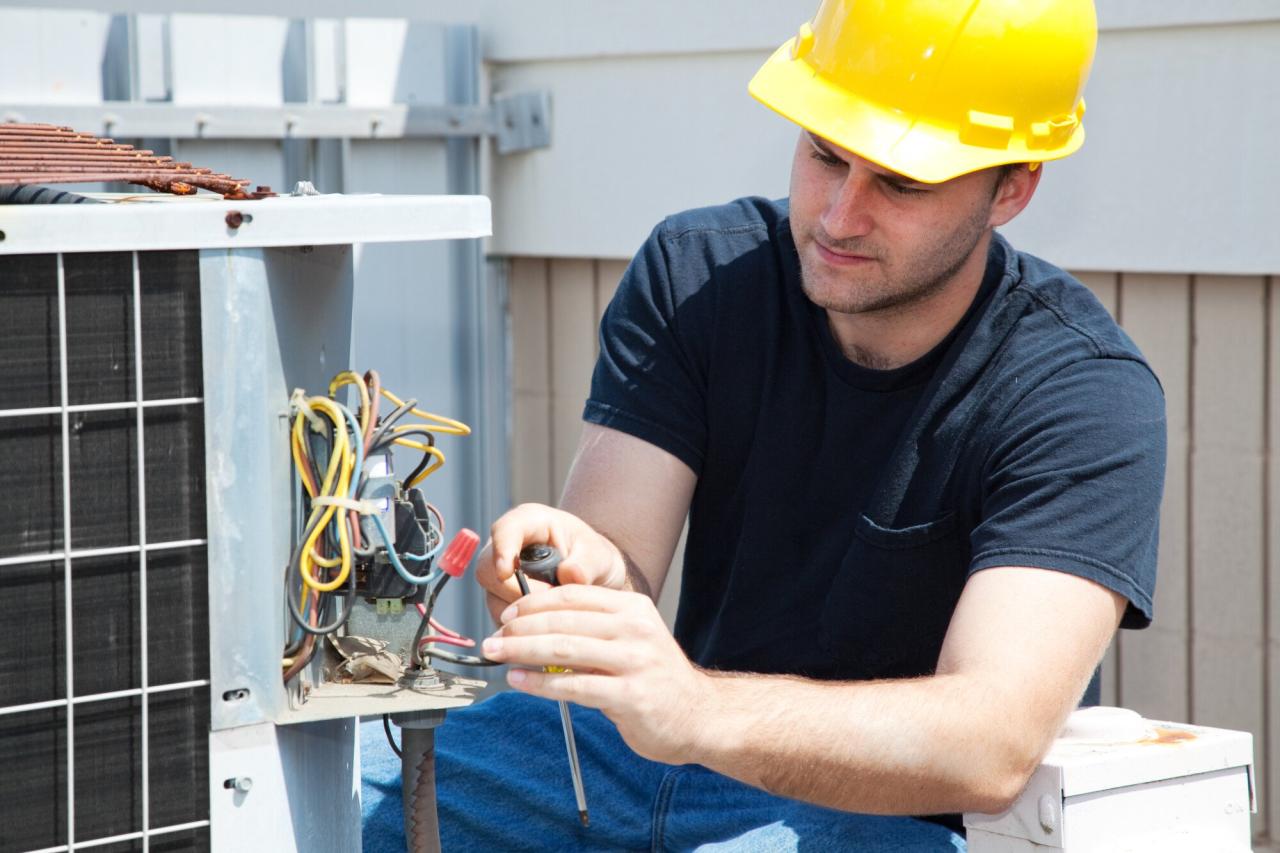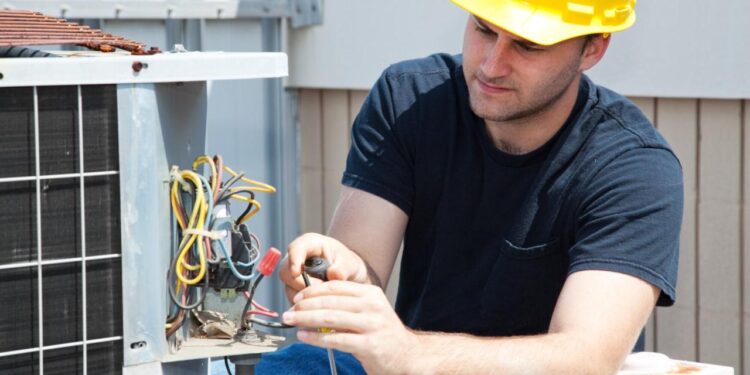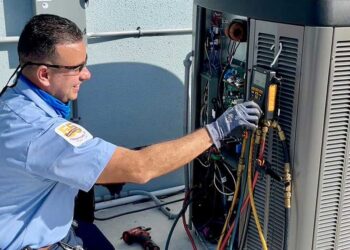Embark on a journey through the world of residential HVAC repair, where we unravel the intricacies of maintaining and troubleshooting these essential systems in your home. From understanding how HVAC systems work to knowing when to call a professional, this guide covers it all.

How HVAC systems work
Residential HVAC systems play a crucial role in maintaining a comfortable indoor environment by regulating temperature and air quality. Understanding how these systems work can help homeowners identify and address potential issues.
Basic Components of a Residential HVAC System
A typical residential HVAC system consists of several key components:
- Thermostat: The control center that allows users to set the desired temperature.
- Furnace: Heats air and distributes it throughout the home via ductwork.
- Air Conditioner: Cools and dehumidifies the air before circulating it back into the living spaces.
- Ductwork: Channels that transport heated or cooled air to different rooms.
- Air Filter: Cleans the air by trapping dust, pollen, and other particles.
Role of Each Component
- Thermostat: Controls when the HVAC system turns on and off based on the set temperature.
- Furnace: Generates heat through combustion or electricity to warm the air.
- Air Conditioner: Removes heat from indoor air and releases it outside, cooling the interior.
- Ductwork: Distributes conditioned air throughout the home via vents and registers.
- Air Filter: Improves indoor air quality by capturing pollutants and allergens.
Common HVAC Issues
- Dirty Air Filters: Reduced airflow and strain on the system.
- Refrigerant Leaks: Decreased cooling capacity and potential damage to the compressor.
- Thermostat Malfunctions: Incorrect temperature readings leading to inefficient operation.
- Clogged Ducts: Uneven heating or cooling distribution throughout the house.
Importance of regular HVAC maintenance
Regular maintenance of residential HVAC systems is crucial to ensure optimal performance, energy efficiency, and longevity of the equipment. By taking proactive measures to maintain your HVAC system, you can avoid costly repairs, improve indoor air quality, and increase the overall comfort of your home.
Benefits of regular maintenance
- Extended lifespan of the HVAC system
- Improved energy efficiency, leading to lower utility bills
- Prevention of major breakdowns and costly repairs
- Enhanced indoor air quality by replacing filters and cleaning ducts
- Consistent and reliable heating and cooling throughout the year
Key maintenance tasks for homeowners
- Regularly check and replace air filters every 1-3 months
- Clean debris and obstructions around outdoor unit
- Inspect and clean evaporator and condenser coils annually
- Ensure proper airflow by keeping vents and registers unblocked
- Schedule professional HVAC maintenance at least once a year
Consequences of neglecting HVAC maintenance
- Decreased energy efficiency and increased utility bills
- Higher risk of system breakdowns and costly repairs
- Poor indoor air quality, leading to health issues
- Shortened lifespan of HVAC equipment
- Inconsistent heating and cooling performance
Common signs that indicate the need for HVAC repair
When it comes to residential HVAC systems, certain signs can indicate that your system needs repair. Ignoring these signs can lead to more significant problems down the line.
Strange Noises or Odors
Strange noises such as banging, hissing, or grinding coming from your HVAC system can be a clear indication that something is amiss. Similarly, unusual odors like mustiness or burning smells can signal potential issues that need to be addressed promptly.
Changes in Performance
If you notice a decrease in airflow, uneven heating or cooling in different rooms, or your system is struggling to maintain the desired temperature, it could be a sign that your HVAC system requires repair. These changes in performance can indicate underlying problems that need professional attention.
DIY troubleshooting for minor HVAC issues
When facing minor HVAC issues, it can be tempting to try and fix them yourself. However, it's important to follow proper troubleshooting steps and safety precautions to avoid causing further damage. Here is a step-by-step guide for troubleshooting minor HVAC problems:
Check the Thermostat
- Make sure the thermostat is set to the correct temperature.
- Replace the batteries if needed.
- Dust and clean around the thermostat to ensure proper function.
Inspect the Air Filter
- Turn off the HVAC system before checking the air filter.
- If the filter is dirty, replace it with a new one.
- Regularly changing the air filter can improve airflow and system efficiency.
Check the Circuit Breaker
- Inspect the circuit breaker to see if it has tripped.
- If the breaker has tripped, reset it and monitor the system.
- Consult a professional if the breaker continues to trip.
Inspect Air Vents and Ducts
- Ensure all air vents are open and unobstructed.
- Check for any leaks or damage in the ductwork.
- Clean the air vents and ducts to improve airflow.
Safety Precautions
- Always turn off the power before attempting any DIY repairs.
- Avoid touching any exposed electrical components.
- If you are unsure or uncomfortable with any repair, call a professional.
When to Call a Professional
- If you are unable to diagnose the issue after troubleshooting.
- If there is a strange or burning smell coming from the HVAC system.
- If the system is making loud or unusual noises.
Hiring a professional HVAC technician
When it comes to HVAC repairs, hiring a certified professional technician is crucial to ensure the job is done correctly and safely. These professionals have the necessary skills, knowledge, and experience to diagnose and fix issues with your HVAC system efficiently.
Key factors to consider when choosing an HVAC repair service
- Certifications and licenses: Ensure the HVAC technician is certified and licensed to work on HVAC systems in your area.
- Experience: Look for technicians with a proven track record of successfully repairing HVAC systems.
- Reputation: Check online reviews and ask for referrals to gauge the reputation of the HVAC repair service.
- Pricing: Get quotes from multiple HVAC repair services and compare them to ensure you are getting a fair price for the services provided.
- Response time: Choose a repair service that offers prompt response times, especially in emergency situations.
Compare the benefits of hiring professionals versus DIY repairs
- Quality of work: Professional HVAC technicians have the knowledge and expertise to accurately diagnose and repair issues, ensuring the job is done right the first time.
- Safety: HVAC systems involve complex components and electricity, which can be dangerous to work with if you are not trained. Hiring a professional reduces the risk of accidents and injuries.
- Time and convenience: Hiring a professional saves you time and hassle, as they can quickly identify and fix problems without the need for trial and error that DIY repairs may require.
- Warranty protection: Many HVAC repair services offer warranties on their work, providing you with peace of mind that you are covered if issues arise after the repair.
Conclusive Thoughts
In conclusion, taking care of your residential HVAC system is crucial for a comfortable living environment. By staying proactive with maintenance and knowing the signs that indicate repair needs, you can ensure your HVAC system operates efficiently for years to come.
Essential FAQs
What are the basic components of a residential HVAC system?
The basic components include the furnace, air conditioner, ductwork, thermostat, and air filter.
Why is regular HVAC maintenance important?
Regular maintenance ensures optimal performance, prolongs the system's lifespan, and helps prevent costly repairs.
What are common indicators that a residential HVAC system needs repair?
Common signs include strange noises, unusual odors, decreased airflow, and inconsistent temperatures.
What safety precautions should be taken when attempting DIY HVAC repairs?
Turn off power to the system, wear protective gear, and follow manufacturer instructions carefully.
Why is it important to hire a certified HVAC technician for repairs?
Certified technicians have the expertise to diagnose and fix issues correctly, ensuring your system operates efficiently.
















